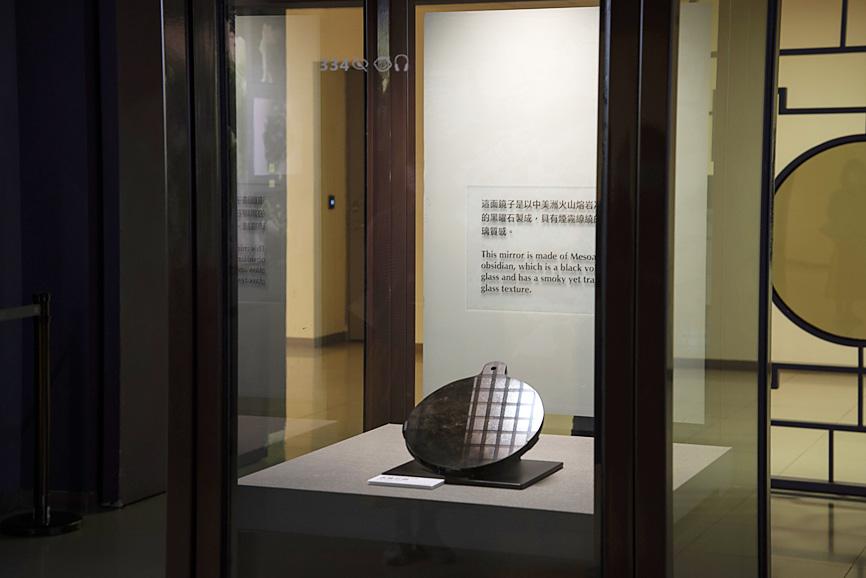An exhibition that opened yesterday at the National Palace Museum in Taipei features a 400-year-old obsidian mirror associated with the Aztec deity Tezcatlipoca.
The mirror is being displayed in Exhibition Room 302, the museum said on Monday.
It was taken from Mesoamerica following the region’s conquest by Spain and found its way to the court of the Qing Dynasty through European missionaries, it said.

Photo courtesy of the National Palace Museum via CNA
The exhibition contains correct and updated information about the artifact, the museum said.
Emperor Shunzhi (順治), the first Qing emperor, attempted to identify the mineral used in the mirror to no avail, it said.
Later Qing emperors Qianlong (乾隆) and Daoguang (道光) wrote songs and poetry in praise of the mirror, showcasing its value within the court, it added.
The Qing court even had a protective pouch made for the mirror, the museum said, adding that the pouch is being displayed alongside the mirror at the exhibition.
As the function, properties and name of the mirror were unknown to the Qing court, it was called the “Ink-Jade Mirror.” The museum retained the name for some time before renaming the piece the “Ink-Crystal Mirror” in its first modern update.
Researchers at the museum have since confirmed that the artifact is a rare obsidian mirror from the Mesoamerican Aztec culture fashioned from the naturally occurring volcanic mineral.
This has resulted in the piece being renamed again to “Aztec Obsidian Mirror” from the Qing imperial collection, the museum said.
Mirrors were important relics in the mystic traditions of Mesoamerican cultures, as they were believed to be portals to intangible realms, such as the past and the future, the museum said.
The mirror is traditionally associated with the god Tezcatlipoca, often representing a wide range of concepts, including the night sky, night winds, the jaguar, sorcery, war and conflict, it said.
Other obsidian mirrors also found their way to European collectors following the fall of the Aztec Empire, the most famous of which belonged to John Dee, an astronomer, occultist and alchemist at the court of Queen Elizabeth I.

The Mainland Affairs Council (MAC) yesterday said it is fully aware of the situation following reports that the son of ousted Chinese politician Bo Xilai (薄熙來) has arrived in Taiwan and is to marry a Taiwanese. Local media reported that Bo Guagua (薄瓜瓜), son of the former member of the Political Bureau of the Central Committee of the Communist Party of China, is to marry the granddaughter of Luodong Poh-Ai Hospital founder Hsu Wen-cheng (許文政). The pair met when studying abroad and arranged to get married this year, with the wedding breakfast to be held at The One holiday resort in Hsinchu

Tropical Storm Usagi strengthened to a typhoon this morning and remains on track to brush past southeastern Taiwan between Friday and Sunday, the Central Weather Administration (CWA) said. The storm, which as of 8am was still 1,100km southeast of southern Taiwan, is currently expected to enter the Bashi Channel and then turn north, moving into waters southeast of Taiwan, the CWA said. Because of its rapid speed — 28kph as of 8am — a sea warning for the storm could be issued tonight, rather than tomorrow, as previously forecast, the CWA said. In terms of its impact, Usagi is to bring scattered or

An orange gas cloud that leaked from a waste management plant yesterday morning in Taoyuan’s Guanyin District (觀音) was likely caused by acidic waste, authorities said, adding that it posed no immediate harm. The leak occurred at a plant in the district’s Environmental Science and Technology Park at about 7am, the Taoyuan Fire Department said. Firefighters discovered a cloud of unidentified orange gas leaking from a waste tank when they arrived on the site, it said, adding that they put on Level A chemical protection before entering the building. After finding there was no continuous leak, the department worked with the city’s Department

MESSAGE: The ministry said China and the Philippines are escalating regional tensions, and Taiwan should be included in dialogue mechanisms on an equal footing Taiwan has rejected renewed sovereignty claims over the South China Sea by the Philippines and China by reaffirming its sovereignty and rights under international law over the disputed area. “The Republic of China [ROC] enjoys all rights to island groups and their surrounding waters in the South China Sea in accordance with international law and maritime laws,” the Ministry of Foreign Affairs (MOFA) said in a statement yesterday. Other countries’ attempts to claim sovereignty over the South China Sea do not change the fact that the ROC holds sovereignty over the region, the ministry said. The MOFA statement came after